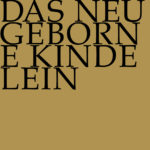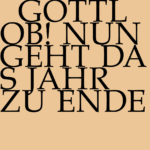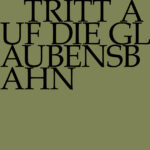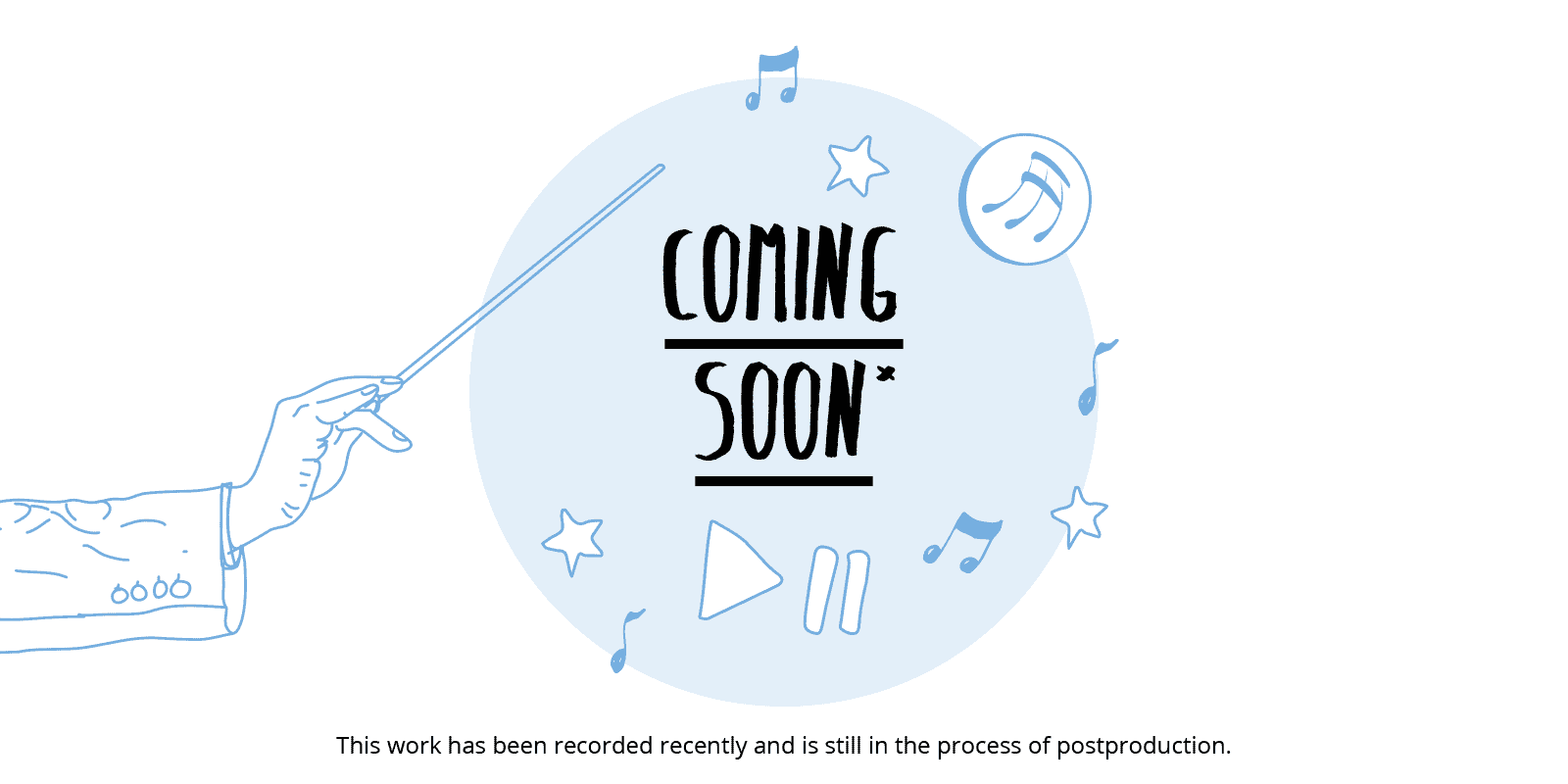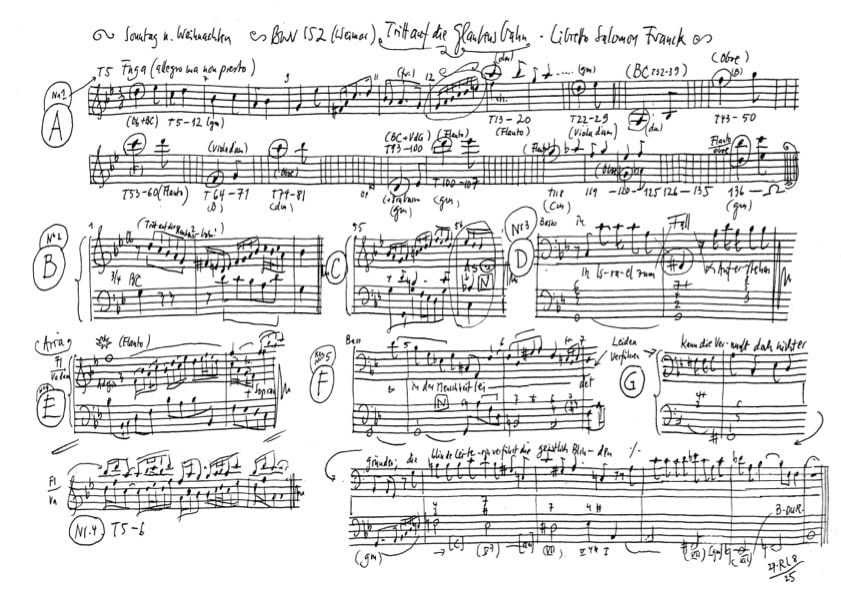Tritt auf die Glaubensbahn
BWV 152 // Sunday after Christmas
(Walk on the road of faith) for soprano and bass, recorder, oboe, viola d’amore, viola da gamba, violone and basso continuo
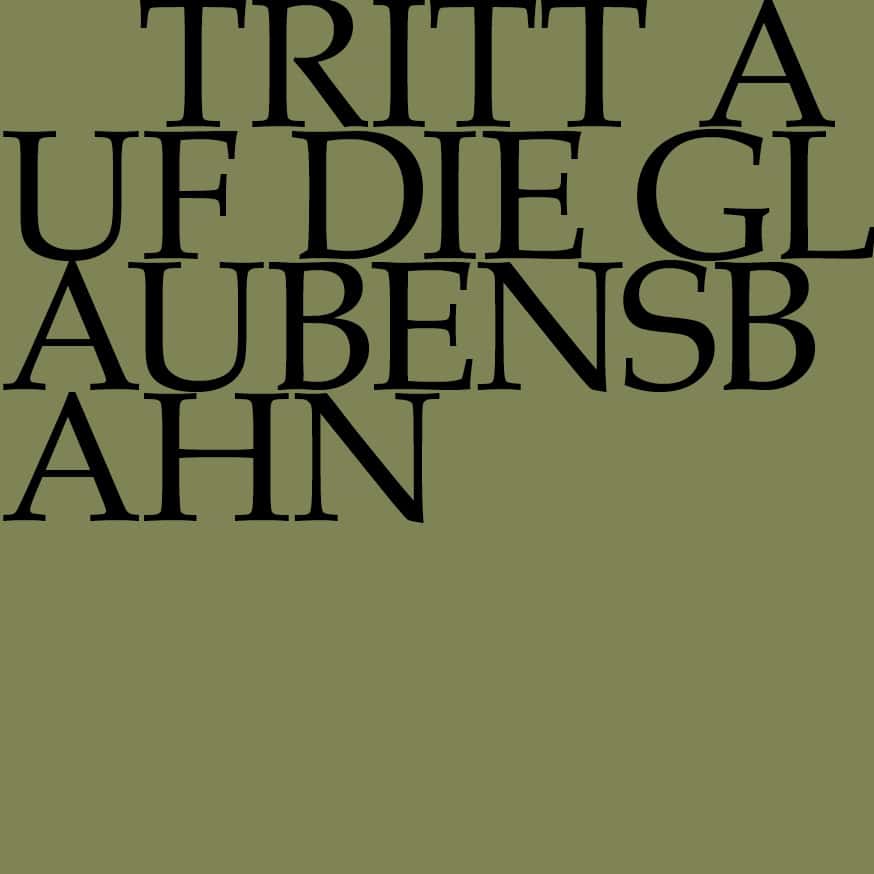
Place of composition in the church year
Pericopes for Sunday
Pericopes are the biblical readings for each Sunday and feast day of the liturgical year, for which J. S. Bach composed cantatas. More information on pericopes. Further information on lectionaries.
Lobet den Herrn, alle Heiden; preiset ihn, alle Völker! Denn seine Gnade und Wahrheit waltet über uns in Ewigkeit. Halleluja!
Ich sage aber: Solange der Erbe unmündig ist, so ist zwischen ihm und einem Knechte kein Unterschied, ob er wohl ein Herr ist aller Güter; sondern er ist unter den Vormündern und Pflegern bis auf die Zeit, die der Vater bestimmt hat. Also auch wir, da wir unmündig waren, waren wir gefangen unter den äusserlichen Satzungen. Da aber die Zeit erfüllet ward, sandte Gott seinen Sohn, geboren von einem Weibe und unter das Gesetz getan, auf dass er die, so unter dem Gesetz waren, erlöste, dass wir die Kindschaft empfingen.
Und sein Vater und seine Mutter verwunderten sich des, das von ihm geredet ward. Und Simeon segnete sie und sprach zu Maria, seiner Mutter: «Siehe, dieser wird gesetzt zu einem Fall und Auferstehen 57 vieler in Israel und zu einem Zeichen, dem widersprochen wird (und es wird ein Schwert durch deine Seele dringen), auf dass vieler Herzen Gedanken offenbar werden.» Und es war eine Prophetin, Hanna, eine Tochter Phanuels, vom Geschlecht Asser; die war wohl betagt und hatte gelebt sieben Jahre mit ihrem Manne nach ihrer Jungfrauschaft und war nun eine Witwe bei vierundachtzig Jahren; die kam nimmer vom Tempel, diente Gott mit Fasten und Beten Tag und Nacht. Die trat auch hinzu zu derselben Stunde und pries den Herrn und redete von ihm zu allen, die da auf die Erlösung zu Jerusalem warteten. Und da sie es alles vollendet hatten nach dem Gesetz des Herrn, kehrten sie wieder nach Galiläa zu ihrer Stadt Nazareth. Aber das Kind wuchs und ward stark im Geist, voller Weisheit, und Gottes Gnade war bei ihm.
Orchestra
Conductor & organ
Rudolf Lutz
Recorder
Lea Sobbe
Oboe
Andreas Helm
Viola d’amore
Rafael Roth
Viola da gamba
Martin Zeller
Violone
Markus Bernhard
Musical director & conductor
Rudolf Lutz
Workshop
Participants
Rudolf Lutz, Pfr. Niklaus Peter
Reflective lecture
Speaker
Roland Reichenbach
Recording & editing
Recording date
19/09/2025
Recording location
Trogen AR (Switzerland) // Evang. Kirche
Sound engineer
Stefan Ritzenthaler
Producer
Meinrad Keel
Executive producer
Johannes Widmer
Production
GALLUS MEDIA AG, Schweiz
Producer
J.S. Bach-Stiftung, St. Gallen, Schweiz
Librettist
First performance
30 December 1714, Weimar
Text
Salomo Franck (printed in 1715)
Libretto
1. Sinfonia
2. Arie — Bass
Tritt auf die Glaubensbahn,
Gott hat den Stein geleget,
der Zion hält und träget,
Mensch, stoße dich nicht dran,
tritt auf die Glaubensbahn!
3. Rezitativ — Bass
Der Heiland ist gesetzt
in Israel zum Fall und Auferstehen.
Der edle Stein ist sonder Schuld,
wenn sich die böse Welt so hart an ihm verletzt,
ja, über ihn zur Höllen fällt,
weil sie boshaftig an ihn rennet
und Gottes Huld und Gnade nicht erkennet.
Doch selig ist
ein auserwählter Christ,
der seinen Glaubensgrund auf diesen Eckstein leget,
weil er dadurch Heil und Erlösung findet.
4. Arie — Sopran
Stein, der über alle Schätze,
hilf, daß ich zu aller Zeit
durch den Glauben auf dich setze
meinen Grund der Seligkeit
und mich nicht an dir verletze,
Stein, der über alle Schätze,
hilf, daß ich zu aller Zeit
durch den Glauben auf dich setze
meinen Grund der Seligkeit!
5. Rezitativ — Bass
Es ärgre sich die kluge Welt,
daß Gottes Sohn
verläßt den hohen Ehrenthron,
daß er in Fleisch und Blut sich kleidet
und in der Menschheit leidet.
Die größte Weisheit dieser Erden
muß vor des Höchsten Rat
zur größten Torheit werden.
Was Gott beschlossen hat,
kann die Vernunft doch nicht ergründen;
die blinde Leiterin verführt die geistlich Blinden.
6. Arie — Sopran (Seele) und Bass (Jesus)
Seele
Wie soll ich dich, Liebster der Seelen, umfassen?
Jesus
Du mußt dich verleugnen und alles verlassen!
Seele
Wie soll ich erkennen das ewige Licht?
Jesus
Erkenne mich gläubig und ärgre dich nicht!
Seele
Komm, lehre mich, Heiland, die Erde verschmähen!
Jesus
Komm, Seele, durch Leiden zur Freude zu gehen!
Seele
Ach, ziehe mich, Liebster, so folg ich dir nach!
Jesus
Dir schenk ich die Krone nach Trübsal und Schmach.
This text has been translated with DeepL (www.deepl.com).
Roland Reichenbach
“And there is always a longing for the unfettered”
Thoughts on Bach’s cantata Tritt auf die Glaubensbahn (BWV 152)
“The forests are old. Older than humans. The forests have seen the gods die” (Paul Celan). Step onto the path of faith! Cut a swath through the forest! The path is the wound, the swath is the blow. Something is moving along a line. Cut your way through the forest of life, no, step onto the path of faith! Your faith is not groundbreaking: water breaks its path, you do not. Have you ever been on course? Do you know the direction? How long is your journey? Long and flat or steep and short? Tell me, Hölderlin, the sacred path, you haven’t found it either? The ancients did not find what they were looking for, and the newcomers will not find what they long for. “And always a longing goes into the unbound.” Nevertheless: keep searching! “Do not search for the ancients, but for what they searched for” (Matsuo Bashō, 1644–1694). There is no other way. Finding makes searching easier (Elazar Benyoëtz). The path is unknown, finding would make searching easier. But that is not the case; we do not find what we are looking for – rather, we find what we were not looking for at all. And you certainly don’t find yourself. Never! Sometimes, for a short time, you invent yourself, so we turn searching into trying. Trying – the prefix “trying” always refers to a problem, to the fact that we are not (or no longer) in control, so we don’t act, but have to negotiate. We misplace things, forget words, dates, people, life. We do not love, so we want to fall in love. Falling in love is the mistake that makes life worth living or unbearable, which is the same thing. Falling in love is easy, love is rare. “Oh, pull me, my love, and I will follow you!” – so goes the penultimate line of the cantata, the path of faith. I don’t know the way, but I will follow you. Pull me, please pull me! But faith will not prevail. It does not pull me. It does not do that. You have to do that yourself. But how? If you want to go home, to your homeland, to safety, you must sacrifice yourself to faith. Isn’t that exaggerated, Helmuth Plessner? But he continues: “But those who follow the spirit, do not return Education, then, means never returning. How wonderful, these exaggerations! I simply love them. So grandiose: “But those who follow the spirit do not return.” Amen. That’s it. I like exaggerations for aesthetic reasons, but also for educational reasons. Listen to Hölderlin: “For never, like mortal masters / Have you heavenly ones, you sustainers of all, / That I might know, with caution / To walk the level path.” The gods do not grant us a level path. Then let us carve out this level path ourselves! Look, this flat path of faith that you have created for yourself, that is your life! You lowlander, who you have become! “What was mountain in you / They have levelled / You and your valley have been filled in / A comfortable path leads over you” (Bertolt Brecht). Step onto the path of faith! “How sad it is when someone leaves their path and does not walk on it, when someone loses their heart and does not know how to find it again!” So said the Chinese philosopher Mencius more than two thousand years ago (Book VI, 11, p. 204). How sad that is! But that is how we are: “When a person loses a chicken or a dog, he knows how to find it again: but when he loses his heart, he does not know how to search for it. Education serves no other purpose than to enable us to search for our lost heart” (ibid.) – the search, la recherche, re-search. Go and search for it again, your heart-mind, even if you don’t know how and where. Go! But how different Bach is! Oh, you great believer Bach! The strict dualism of faith and reason brims with self-assurance in your beautiful cantata! “[1] ” That is not necessary; it does not have to be the consequence of faith. But still, Bach’s conceptual Manichaeism, so blatantly exaggerated, is brilliant; he anticipated and plagiarised Helmuth Plessner. And always beautiful, so once again the path of faith: “The greatest wisdom of this earth / must become the greatest folly before the Highest Council. / What God has decided cannot be fathomed by reason: the blind leader seduces the spiritually blind.” So wrong, so good, so right wrong! The inscrutability of the Lord’s ways does not make reason a blind guide. Here, the great Bach is being pious, and Bach is dripping with piety, as are entire sections of the Reichenbach family. I have a certain understanding for simplicity, this much-praised simplicity and this uninformed, stupid and reflexive rejection of reason and education. A certain understanding, but not a great one! Dear pious exaggerators: praying is good, but so is reading. So read the Bible, for example in the Book of Wisdom of Solomon! About misguided piety (Wisdom 12:23), education and wisdom. Speaking of “blind guides”: “For wisdom is a philanthropic spirit” (1:6). “The Holy Spirit of education will flee from malice, and he will distance himself from foolish thoughts” (1:5). “For those who consider wisdom and education to be worthless are in misery, / and their hopes are futile, their efforts are in vain, and their works are useless” (3:11). It is always very nice to exaggerate on the right side! Wisdom is a philanthropic spirit, “those who cannot sleep at night because of it will soon be free of worries” (6:15). This is the path of faith in education, “but to care for education is love, and love is to keep its precepts, and to follow its precepts is to secure immortality” (3:18). In the contest between the Bible on the one hand and Johann Sebastian Bach and Helmuth Plessner on the other, the score is still 1:0 in favour of the Bible. But we think more than we think (Plessner) and believe more than we believe (Reichenbach), because “atheism is easier said than done” (Plessner again). The decision between faith and reason is unnecessary. But of course we cannot avoid unanswerable questions. Our “ontological resonance organ” (Wolfram Hogrebe) keeps the question of existence alive and at the same time unsettles it. Man lives as a “behaviour towards himself” (Fink 1992, p. 172). He must interpret himself and the world, which is ultimately the same thing. He can only interpret, think, speak and feel from within himself. They always speak on their own behalf. They are familiar with themselves, familiar in their unfamiliarity. So step onto the path of faith! It says: “The wise world is angry / that God’s son / leaves the high throne of honour, / that he clothes himself in flesh and blood / and suffers in humanity.” Oh, can he be the son of God and a human being at the same time? “We do not know each other, for there is a God within us,” said Hölderlin. Does God know us better than we can know ourselves? Or do we know ourselves better than God knows us, even though we know ourselves so poorly? According to Eugen Fink: “We have a closeness to our existence in which we are unsurpassable. No God can experience human life from within, even if he takes on human form: he would then have to cease to be God, he would have to forget his omnipotence, his omniscience: he would have to suffer fear like us, share our joys, our passions, our greatness and our misery. He could not put on our frailty like a beggar’s robe and keep the splendour of his glory hidden beneath it: he would have to truly die like us, be destroyed – and not live secretly in the consciousness of his divine indestructibility” (Fink 1979, p. 39).
The faith train is not a railway, but perhaps it is a kind of railway. My old boss used to say: when the train stops in front of you, you have to get on! Who drives this train? Nobody knows. We haven’t seen anyone! We only encounter the conductors, the ticket inspectors who check whether you really have the right to sit on the faith train. Those who sit on the train of faith should also have the right to believe that they will arrive in Biel or Zurich, Gstaad or Marseille. But does the train of faith actually go anywhere? Doesn’t it just go round in circles or lead nowhere? Was Christian Anders right when he sang in 1972: “There’s a train going nowhere / With me as its only passenger / With every hour that passes / It takes me further away from you?” Do you think you’re smarter than the German pop song? Are you really going to cut this little vain track into your puny forest of life? In 1972, I was ten years old. I sat on the chairlift, which rode through the fog to nowhere. With me as the only passenger. It was eerie. Everything was white and silent. “I assure you: unless you change and become like children, you will never enter God’s new world” (Matthew 18:3). Half a century later, I am sitting on this chairlift again – it is white, silent and eerie. But I don’t want God’s new world. Why does he have to be so innovative, the old God! I don’t want a new world! I want the old one back, just as it was! Lord in heaven, protect us from those who imagine themselves on the path of faith to a new world! Please throw them off this path of faith, these successful believers. Wouldn’t it be better if some believed less and others believed more? Lord, remind those who are so successful in trading their faith of Jesus Sirach: “… between selling and buying, sin will intrude” (Sirach 27:2). But let us all recognise that death will not hesitate, and that “no contract with the underworld has been shown to us” (Sirach 14:12). Can we even walk the path we preach? Can we walk our talk? I must admit that I much prefer to talk than to walk the path. In fact, I don’t walk any path at all, but have always jumped on every train that has stopped in front of me! Long before my old boss gave me this advice. I always knew that you have to jump on board, ” “. Don’t think. Thinking means not jumping on board. The train stops, I jump on! I’ve always got on! I’m a newcomer! I balance my tendency to get on every train with my inclination to get off every train again. I’m even more of a dropout than a newcomer. At least inwardly, I’ve always gotten off quickly, hardly after I got on. I was married for a long time. I’ve always been on some kind of train! The train of faith, the train of commitment, the train of relationships, the train of education, the academic career train, the train of happiness, the train of misfortune, the train of delusion – this train delusion has always been part of me. I get on anything that looks like a normal or crazy train! I get on in the morning as a philanthropist and get off in the evening as a misanthrope. And when I start getting on as a misanthrope in the morning, I change trains or try to change trains, depending on which one stops in front of me. “If you are among the unwise, go at the right time / to those who think, but stay” (Sirach 27:12). So there is usually no reason to stay. So I don’t stay, I leave. Nobody stays. So I threw myself off the train, or rather off train travel, which means that I have not only left the train, but have completely given up train travel. At least, that’s how it seems to me. Sometimes, however, I think I was never on the train of faith in the first place. Then again, I feel its loss, I miss it. Sometimes I no longer feel the loss, then I have lost the feeling of loss. Only the forgotten and lost loss is the true loss. Sometimes you still know that you have forgotten something, but you no longer know what it was. Fortunately, however, the feeling of loss is still there. Mencius speaks of this. Many speak of it, whether with words or muscles, with weapons or art. Officially, there are only dogs and chickens, lots of dogs and chickens, which we can find if we look for them. Unofficially, there is this other thing that I cannot get out of my mind and about which nothing can be said. How to search? Is it the longing for the path of faith? “And I can’t forget, and I can’t forget, but I don’t remember what” (Leonard Cohen).
Perhaps we should not know exactly what we believe. Those who believe know that they do not know. Belief is about subjective certainty of what is objectively uncertain! Those who embark on the path of belief do not embark on the path of knowledge – for that does not exist, except as an illusion. Belief is not knowing and not thinking, said Immanuel Kant. Opinion is about the insight that one has not only no objective knowledge, but also no subjective certainty. Therefore, true opinion is the most modest form of knowledge. Those who believe but think they know do not understand their belief (ultimately, they do not believe, but think they know for sure). These people should be thrown off the path of belief, if that were possible. But in our part of the world and in our era, they are ridiculed by all those who think they know. And there are many of them. Educational institutions are full of them. They think they are enlightened, but in fact they think a lot and think a lot and think firmly. That is doxa: they believe they are in possession of the right opinion, which is ortho-doxa. In short: we are surrounded, even encircled, by secular orthodox believers and strict believers. They consider themselves knowledgeable. Their certainty knows no God, no gods, no modesty and no humility. They are the personalised loss of the feeling of loss. They long for nothing because they “know” everything. They believe nothing because they “know” everything. The gods are not dead, Paul Celan, that’s what I wanted to say, the forests have seen the gods die, yes, but now they are back. They are a new kind. They are different gods who surround us, they are apotheoses, self-deifications. They do not struggle like Mother Teresa, they have always been on their own personal path of faith, on this path that circles ever closer around them and grips them ever more tightly, allowing their hermeneutics of self-understanding to calcify. This is secular-religious sclerosis, the hardening of the organ of religious perception. I don’t know what this religious organ is, but I strongly believe that it should not harden. The religious organs, the organs of faith, should remain soft. So let us remain soft, soft-minded, and if we believe, then let us believe softly. Soft is better. Goodness is soft, not hard; love is soft, and forgiveness is soft even when it is hard. We know a lot, but we believe even more, and we mean the most. Perhaps it is about the longing for faith remaining unfulfilled. The longing should not cease. Perhaps it is about not confusing the sand on which we try to build our puny tent of faith with the solid ground, the unshakeable yet hard rock in the surf. I became fond of Mother Teresa when the posthumous publication of her diaries revealed that she struggled with her faith. The saint struggles – so she was a real human being, a searching and longing creature! Mother Teresa embarked on the path of faith: “God has laid the stone in , / which holds and carries Zion, / Man, do not stumble upon it, / step onto the path of faith!” It is difficult to believe firmly and at the same time know that one does not know. It is easy to be pious and believe that one knows. You are just annoying! So very much so. The politicised zeitgeist is now also being pious, from left to right, everywhere this feigned affectation or this hypocritical enlightened political nonchalance, this delusion of possessing the political philosopher’s stone or the religious stone of true faith. It must be a truly satisfying and reassuring thing to possess such smooth, polished stones. Faith is a matter of hope and desire. Hope is not something you have, hope is something you practise. “We are not persistent because we have hope, we have hope because we are persistent,” said a young man at the Hong Kong umbrella protests in 2014. That impressed me. In hindsight, one could cynically say that the protests ultimately achieved nothing. Cynicism is rubbish. Those who hope do not know. Those who believe do not know. The objectively uncertain – that is what the path of faith is all about. And “there is always a longing for the unbound“.
[1] The text was written by Salomon Frank, “Weimar court poet,” and printed in 1715.
https://www.academia.edu/19841879/Gott_in_Plessners_Anthropologie


